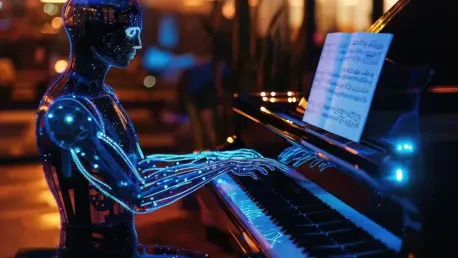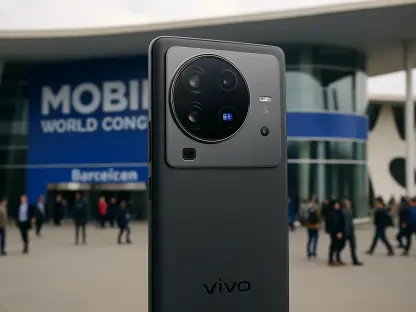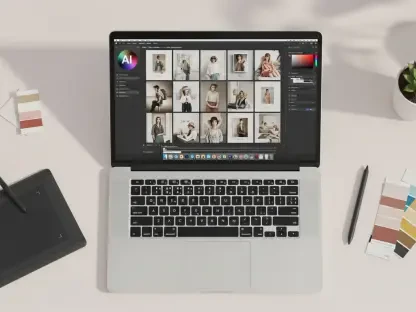Artificial Intelligence (AI) has become a central figure in the music industry, propelling forward rapid innovations while sparking significant debates on authenticity and creativity. This roundup article gathers insights from various industry experts, musicians, critics, and legal analysts to explore AI’s role in music. It aims to present a balanced view on whether AI signifies an evolutionary tool or an imitation threat.
Historical Milestones: From Synthesizers to AI Transformations
The interplay between technology and music is not new. The advent of synthesizers, drum machines, and auto-tune marked significant milestones that shaped modern music. Each innovation brought its share of skepticism but ultimately became integral to musical creation. The evolution from these predecessors to AI illustrates a continuous trend of technological experimentation within the industry.
Industry leaders acknowledge that AI has significantly influenced music over the past few years, especially with AI-generated music becoming more prevalent. Some argue that AI represents another step in music’s natural technological progression, while others fear it may signal the decline of authentic music.
Legal and Ethical Challenges: Navigating Complex Terrain
The rise of AI-generated music has led to legal battles between major music corporations and AI platforms over copyright infringement concerns. These legal disputes highlight a crucial aspect of the discussion: the protection of intellectual property in the age of AI. Music corporations worry about the unauthorized use of copyrighted materials to train AI models, fearing it undermines the rights of original artists.
Ethical considerations also come to the forefront, focusing on profit distribution, artist consent, and the origins of AI-generated content. The industry grapples with ensuring fair compensation for creators while embracing technological advancements. Legal analysts suggest that clearer regulatory frameworks are imperative to address these evolving challenges.
Creative Synergy: AI as a Creative Assistant
AI’s potential as a creative assistant rather than a replacement for human musicians is a prominent narrative within the industry. Musicians have begun leveraging AI to assist with various aspects of music creation, from composition to genre experimentation and lyric generation. This collaboration has the potential to enhance creativity, offering new avenues for artistic expression.
Real-world examples show artists using AI to push the boundaries of traditional music, blending genres, and creating novel sounds. However, the discussion remains divided on whether AI can genuinely contribute to creative diversity or if it risks leading to homogenization in music.
Dissecting AI-Generated Music: Authenticity vs. Innovation
The debate over the depth and authenticity of AI-generated music compared to human-created music intensifies as AI technologies advance. Critics argue that AI-generated music often lacks the emotional depth and authenticity characteristic of human expression, reducing it to mere imitations. However, proponents highlight AI’s innovative potential in genre blending and creating unique market dynamics.
Emerging trends indicate that AI is beginning to influence regional music styles, introducing new sounds into traditionally segmented markets. The question of whether AI can evoke real emotions nonetheless remains central to the discussion, with experts offering varying perspectives.
Democratizing Music Creation: Lowering Barriers
AI’s inclusive potential to democratize music creation offers a significant insight into its role in the industry. AI tools can lower barriers for aspiring musicians, especially those in under-resourced areas, by providing accessible platforms for music experimentation and production. This democratization allows a broader range of voices to contribute to the musical landscape.
Comparative analyses indicate a growing availability of AI tools for both amateur and professional creators, fostering greater inclusivity in music production. Future directions hint at continued advancements that may further simplify music creation processes, making them accessible to a wider audience.
Strategic Takeaways and Best Practices
Insights gathered from various industry experts underscore AI’s transformative impact on music. Musicians, producers, and stakeholders can leverage AI tools to enhance creativity while remaining mindful of ethical considerations. It is crucial to ensure that AI’s integration into the creative process respects artist rights and maintains the integrity of original works.
Recommendations include adopting transparent practices for AI developments, fostering collaborations between human creatives and AI, and prioritizing education about responsible AI use. The aim should be to harness AI’s potential while safeguarding the unique qualities that define human creativity.
Conclusion: Charting the Future Sound of Music
AI’s influence on music has presented both opportunities and challenges, with the industry navigating this dual nature. The future holds promise for AI as a collaborator in music creation, provided it is employed responsibly. A balanced approach that embraces AI’s innovative capabilities while protecting artistic integrity will shape the future of music.
Actionable steps for the industry involve continued dialogue on regulatory frameworks, ethical guidelines, and fostering an inclusive environment for music creation. Embracing AI responsibly can lead to a vibrant musical landscape where technology enhances human creativity rather than replacing it.









